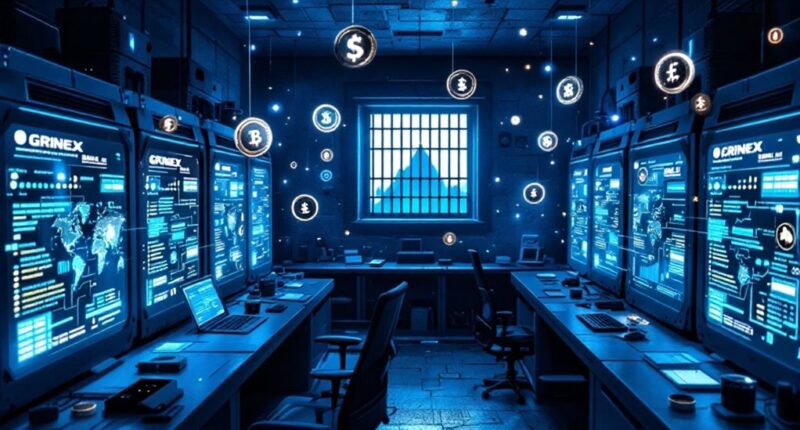While international sanctions forced crypto exchange Garantex to shutter its operations in March 2025, a new platform called Grinex emerged almost immediately, raising significant red flags in the cryptocurrency community.
Swiss blockchain analytics firm Global Ledger has identified striking similarities between the two exchanges, pointing to identical infrastructure and a user interface that mirrors Garantex’s platform almost perfectly.
The financial footprints tell a compelling story. Approximately $60 million in A7A5 stablecoins—digital tokens pegged to the Russian ruble—migrated from Garantex to Grinex through a complex burning and reminting process designed to obscure the funds’ origins. Notably, these stablecoins are backed by Russia’s Promsvyazbank for liquidity.
Following the money reveals a $60 million digital shell game, laundering sanctioned funds through cryptocurrency’s regulatory blind spots.
It’s like watching someone swap a marked $100 bill for fresh ones at different banks across town, except this digital shell game involves billions in cryptocurrency.
Former Garantex users report a suspiciously seamless changeover, with their funds mysteriously appearing in new Grinex accounts. Some customers have confirmed visiting Garantex’s physical offices to facilitate these transfers, while Grinex staff openly admit to helping with customer migrations.
Grinex has processed over $29 million in incoming transactions by mid-March, with monthly volumes exceeding $68 million. The exchange cleverly routes transactions through local Russian banks already under sanctions, fundamentally creating a financial island isolated from international oversight.
This sanctions-dodging tactic presents significant challenges for regulators and law enforcement. The decentralized nature of cryptocurrency makes enforcing unilateral sanctions particularly difficult, requiring enhanced blockchain analytics and unprecedented cross-border collaboration.
For the broader crypto industry, Grinex represents a concerning trend that could trigger stricter compliance measures and potentially damage the ecosystem’s reputation. Such evasive activities could prompt regulators to implement global compliance standards across previously unregulated markets.
The exchange’s apparent connections to ransomware groups and darknet markets further compound these worries.
These concerns intensified following the arrest of Garantex co-founder Aleksej Bešciokov in India, who currently awaits extradition to face charges related to illicit financial activities.
As cryptocurrency technology continues outpacing regulatory frameworks, the case of Grinex highlights a growing tension between financial innovation and international security concerns, raising questions about the effectiveness of traditional sanctions in an increasingly decentralized financial landscape.









